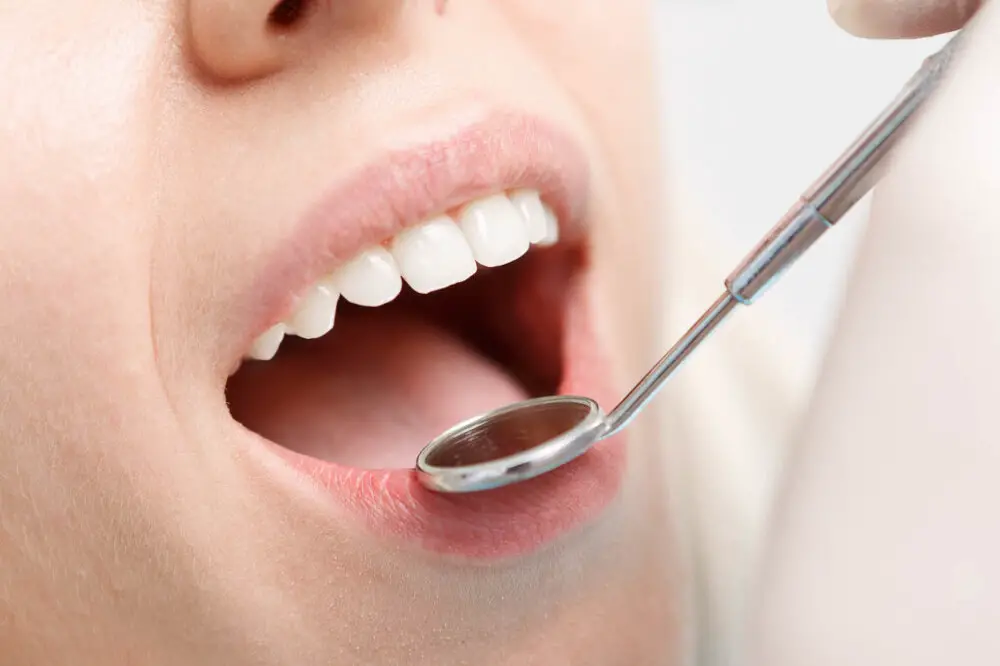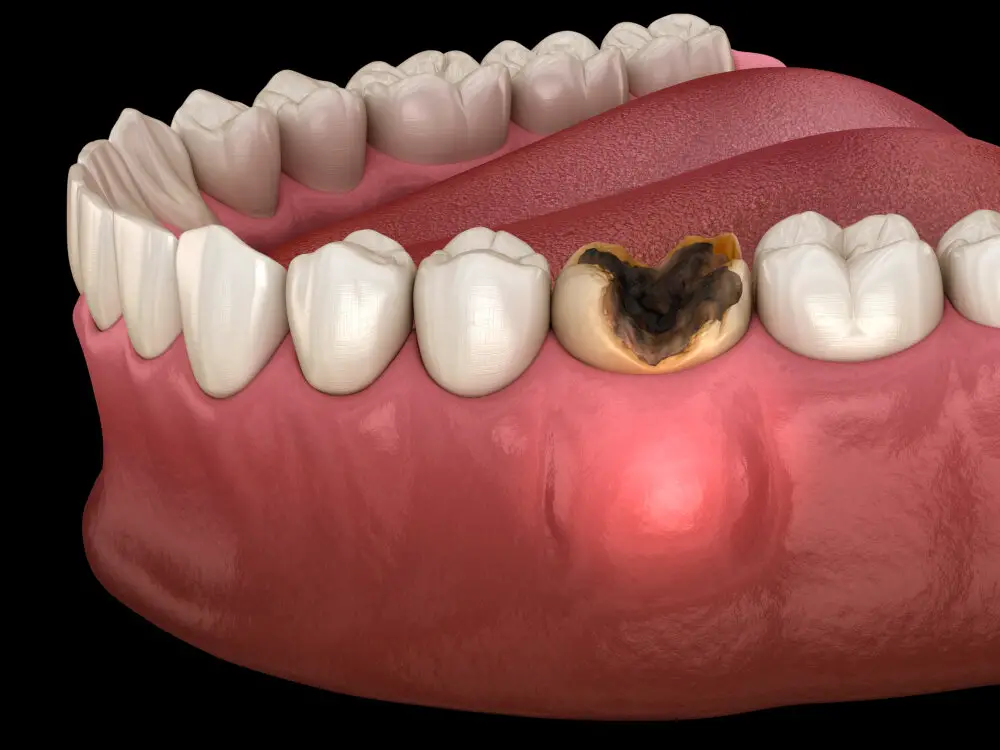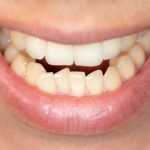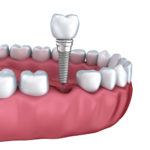How to Prevent Tooth Sensitivity When Eating Sweets: Expert Tips

Tooth sensitivity can make even the most indulgent dessert seem like a punishment. The sharp, shooting pain that comes from consuming sweets can be caused by a variety of factors, from receding gums to enamel erosion. Luckily, there are expert tips and tricks that can help prevent tooth sensitivity when eating sweets. From proper oral hygiene to dietary adjustments, there are many steps you can take to enjoy your favorite treats without the discomfort. One of the most effective ways to prevent tooth sensitivity when eating sweets is to maintain good oral hygiene. Brushing twice a day with a fluoride toothpaste and flossing daily can help remove plaque and protect the teeth from decay. Additionally, using a mouthwash that contains fluoride can help strengthen the enamel and reduce sensitivity. Regular dental cleanings and check-ups can also help catch any potential issues early on, before they develop into more serious problems. By taking these simple steps, you can protect your teeth and enjoy your favorite sweets without any discomfort or pain.
Tooth sensitivity is a common dental problem that can cause discomfort or pain when consuming hot or cold food and drinks, as well as sweets. It occurs when the protective enamel layer of the tooth wears down, exposing the underlying dentin and nerve endings. This can happen due to various reasons such as aggressive brushing, gum recession, tooth decay, and acid erosion from consuming acidic foods and drinks. Other factors that can contribute to tooth sensitivity include teeth grinding, cracked teeth, and certain dental procedures. It is important to identify the underlying cause of tooth sensitivity and take preventive measures to avoid further damage to the teeth.
Tooth sensitivity when consuming sweets can be a painful and uncomfortable experience. It occurs when the protective layer of the enamel wears down, exposing the underlying dentin and nerves. This leaves teeth vulnerable to sensitivity when exposed to hot, cold, or sweet foods. Preventing tooth sensitivity when consuming sweets is important not only for comfort but also for maintaining good oral health. If left untreated, tooth sensitivity can lead to more significant dental problems, such as cavities and gum disease. By taking steps to prevent tooth sensitivity, such as practicing good oral hygiene and limiting consumption of sugary foods and drinks, individuals can maintain healthy teeth and gums and avoid the discomfort of sensitive teeth.
Choose the Right Toothpaste

Choosing the right toothpaste is crucial when it comes to preventing tooth sensitivity caused by consuming sweets. Toothpaste plays a vital role in maintaining oral hygiene, and selecting the right one is significant to keep your teeth and gums healthy. Toothpaste comes in various types, and each one has a specific function. The most common type of toothpaste is fluoride toothpaste, which helps in protecting your teeth from cavities and decay. However, if you are prone to tooth sensitivity, you may need to look for a toothpaste that caters to this problem. Toothpaste that contains potassium nitrate or strontium chloride can help reduce sensitivity and relieve discomfort caused by consuming sweets. It is essential to read the label of the toothpaste before buying it. Toothpaste that claims to be for sensitive teeth may contain desensitizing agents that can help alleviate discomfort. However, it is crucial to consult your dentist before switching to a new toothpaste. Your dentist may recommend specific toothpaste that is suitable for your oral health requirements. Also, make sure you use the right amount of toothpaste when brushing your teeth. A pea-sized amount is sufficient to clean your teeth and gums effectively. Remember, a good toothpaste, along with regular brushing and flossing, can help prevent tooth sensitivity and ensure optimal oral health.
Toothpaste that helps prevent sensitivity is designed to reduce the discomfort and pain caused by tooth sensitivity, especially when consuming sweet or acidic foods. These toothpastes typically contain active ingredients such as potassium nitrate, stannous fluoride, or strontium chloride, which help to desensitize the nerve endings in the teeth. Additionally, toothpaste that helps prevent sensitivity may also contain ingredients that help to strengthen and protect the tooth enamel, such as fluoride or calcium. By using toothpaste that helps prevent sensitivity regularly, individuals can reduce their risk of developing tooth sensitivity and enjoy their favorite sweet treats without discomfort.
Choosing the right toothpaste is essential to maintain good oral hygiene and prevent tooth sensitivity when eating sweets. Firstly, it is important to look for toothpaste that contains fluoride, as it helps to prevent cavities and strengthen enamel. Secondly, individuals with sensitive teeth should opt for toothpaste that is specifically designed for sensitive teeth, as it helps to reduce pain and discomfort caused by hot, cold or sweet foods. Thirdly, those who are prone to gum disease should choose toothpaste that contains antibacterial agents to prevent the buildup of plaque and tartar. Lastly, it is important to choose toothpaste that is suitable for your age group and dental needs, as different toothpastes are formulated for different purposes. By following these tips, individuals can choose the right toothpaste that meets their specific needs and prevents tooth sensitivity when eating sweets.
Brush Properly

Taking care of your teeth can be a challenge, especially when it comes to preventing tooth sensitivity when eating sweets. One of the most important steps you can take is to brush properly. This means using the right technique and tools to clean your teeth effectively. When you brush, be sure to use a soft-bristled brush and fluoride toothpaste. You should also brush for at least two minutes, using small circular motions to clean each tooth thoroughly. Don’t forget to brush your tongue and the roof of your mouth as well to remove bacteria and freshen your breath. In addition to brushing, it’s important to floss and use mouthwash regularly. Flossing helps remove plaque and food particles from between your teeth, where your toothbrush can’t reach. Mouthwash can help kill bacteria and freshen your breath. When choosing a mouthwash, look for one that contains fluoride to help strengthen your teeth. By taking these steps to maintain good oral hygiene, you can help prevent tooth sensitivity and enjoy your favorite sweets without discomfort.
Proper brushing techniques are essential for maintaining healthy teeth and preventing tooth sensitivity. Brushing your teeth properly removes plaque and bacteria that can cause decay and gum disease. When brushing, it is important to use a soft-bristled toothbrush and to brush in a circular motion to avoid damaging your gums. Additionally, it is recommended to brush your teeth for at least two minutes twice a day, focusing on each tooth and the gum line. Proper brushing techniques not only prevent tooth sensitivity, but also promote overall oral health and hygiene. By taking the time to brush your teeth properly, you can keep your smile healthy and beautiful for years to come.
To prevent tooth sensitivity when eating sweets, it is important to brush properly. The first tip is to use a soft-bristled toothbrush and brush gently in circular motions. Hard brushing can wear away the enamel and expose the sensitive dentin underneath. It is also important to use a fluoride toothpaste that can help strengthen the enamel. Another tip is to avoid brushing immediately after consuming acidic or sugary foods, as this can further damage the enamel. Instead, rinse your mouth with water or chew sugar-free gum to stimulate saliva production, which can neutralize acid and prevent cavities. Finally, it is recommended to brush twice a day for at least two minutes each time, and to floss daily to remove plaque and food particles from between the teeth.
Avoid Certain Foods and Drinks

To prevent tooth sensitivity when eating sweets, it is important to avoid certain foods and drinks that can contribute to the problem. Acidic foods and drinks, such as citrus fruits, tomatoes, wine, and carbonated beverages, can erode the enamel on your teeth and expose the sensitive dentin underneath. This can lead to discomfort and pain when consuming sweets or other sugary foods. It’s best to limit your consumption of these acidic items or rinse your mouth with water after consuming them to help neutralize the acid. In addition to acidic foods and drinks, you should also avoid consuming excessive amounts of sugary foods and drinks. Foods high in sugar can lead to the growth of bacteria in your mouth, which can cause tooth decay and increase your risk of tooth sensitivity. Instead of snacking on candy or sugary drinks, try to opt for healthier options like fresh fruits, vegetables, and water. If you do consume sugary foods, be sure to brush your teeth afterwards to remove any lingering sugar and prevent bacteria growth. By avoiding certain foods and drinks and making healthier choices, you can help prevent tooth sensitivity and maintain healthy teeth and gums.
Tooth sensitivity is a common dental issue that causes discomfort and pain while consuming certain foods and drinks. Some foods that can trigger tooth sensitivity include acidic foods such as citrus fruits, tomatoes, and vinegar-based dressings. Additionally, sugary and sticky foods like candies, cakes, and cookies can also cause tooth sensitivity. Drinking cold or hot beverages like coffee, tea, and soda can also irritate sensitive teeth. It is important to avoid consuming these foods and drinks or to limit their intake to prevent tooth sensitivity. Maintaining good oral hygiene practices such as brushing twice a day, flossing, and using fluoride toothpaste can also help prevent tooth sensitivity.
If you are experiencing tooth sensitivity when eating sweets, there are several alternatives you can try that are less likely to cause discomfort. One option is to choose sugar-free sweets or desserts, as sugar can be a major contributor to sensitivity. Another alternative is to opt for desserts made with alternative sweeteners such as xylitol or stevia, which are less likely to cause sensitivity. Additionally, you can try eating sweets with a meal or snack, rather than on their own, as this can help to buffer the sugar and reduce the risk of sensitivity. Finally, consider practicing good oral hygiene habits such as brushing and flossing regularly, as this can help to prevent sensitivity and protect your teeth from damage.
Visit Your Dentist Regularly

Visiting your dentist regularly is an essential aspect of maintaining good dental health and preventing tooth sensitivity. Regular check-ups and cleanings can help detect and address any dental issues before they worsen, including tooth decay, gum disease, and enamel erosion. These issues can all contribute to tooth sensitivity, making it difficult to enjoy sweets or even hot or cold beverages. During routine dental visits, your dentist can also provide recommendations for preventing tooth sensitivity, such as using a desensitizing toothpaste or avoiding acidic foods and drinks. They can also provide fluoride treatments, which can help strengthen the enamel and reduce sensitivity. In addition, your dentist may suggest other preventive measures, such as wearing a mouthguard if you grind your teeth at night or using a soft-bristled toothbrush to avoid damaging the enamel. By following these recommendations and visiting your dentist regularly, you can help reduce the risk of tooth sensitivity and prevent further dental issues.
Regular dental checkups are an essential part of maintaining good oral health. They help to detect any potential issues before they become more serious or painful. Tooth sensitivity when eating sweets can be a sign of larger dental problems that may require professional attention. During a dental checkup, a dentist will not only check for cavities and gum disease, but will also look for signs of enamel erosion or cracks in your teeth. By catching these issues early, they can be treated before they lead to more significant problems, such as tooth decay or even tooth loss. Additionally, regular checkups and cleanings can help prevent tooth sensitivity by removing built-up plaque and tartar that can irritate your teeth and gums. Making dental checkups a priority is an important step in maintaining a healthy and pain-free smile.
Dentists play a crucial role in preventing tooth sensitivity by educating patients on proper oral hygiene practices and recommending appropriate dental treatments. They may suggest using desensitizing toothpaste or fluoride treatments to strengthen tooth enamel and reduce sensitivity. Additionally, they may advise patients to cut back on sugary foods and drinks to prevent tooth decay and erosion, which can lead to sensitivity. Dentists may also recommend wearing a mouthguard at night to prevent teeth grinding, which can wear down tooth enamel and cause sensitivity. By partnering with a dentist and following their recommendations, patients can reduce their risk of tooth sensitivity and maintain optimal oral health.
Tooth sensitivity can be a quite unpleasant experience for anyone, particularly when consuming sweets. It can cause sharp and shooting pain in your teeth and create discomfort for hours. Therefore, preventing tooth sensitivity when eating sweets is crucial to maintain good oral health and enjoy a pain-free eating experience. The sensitivity may occur due to the weakening of tooth enamel or gum recession, leaving the sensitive parts of the teeth open to external stimuli. By following expert tips like avoiding sugary drinks, brushing with sensitivity toothpaste, and flossing regularly, you can reduce the chances of tooth sensitivity and keep your teeth healthy and strong.
Maintaining good oral health is crucial to prevent tooth sensitivity when eating sweets. Brush your teeth twice a day with fluoride toothpaste and use dental floss to remove plaque and food particles from between your teeth. Limit your intake of sugary and acidic foods and drinks, and if you do indulge, rinse your mouth with water or chew sugar-free gum afterward. Visit your dentist regularly for cleanings and check-ups to detect and treat any dental issues before they become more serious. Finally, consider using a desensitizing toothpaste or mouthwash to help alleviate any sensitivity you may experience while enjoying your favorite sweet treats. By following these tips, you can enjoy your favorite sweets without the discomfort of tooth sensitivity.
Conclusion

In conclusion, tooth sensitivity can be a nuisance and a source of discomfort when trying to enjoy sweet treats. However, by following the expert tips shared in this article, it is possible to prevent tooth sensitivity and still enjoy your favorite sugary snacks. From maintaining good oral hygiene to avoiding certain types of sweets, there are various ways to protect your teeth and alleviate sensitivity. By taking these measures, you can maintain a healthy, pain-free smile and indulge in your favorite treats without any worry. Remember, prevention is the key to keeping tooth sensitivity at bay, so start implementing these tips today and enjoy a sweet, cavity-free life!







